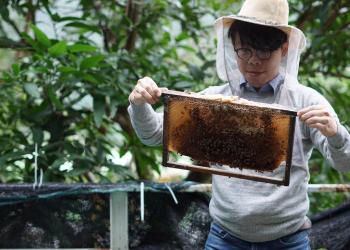News & Stories
2020
News
Becoming Career Ready
Dennis CHOW, a graduate of Mathematics in 2018, is a firm believer in learning by doing. And thanks to his outgoing personality and an insatiable appetite for new challenges, throughout his four years at HKUST, the young man made the most of every opportunity provided by the University to build his experiences and skills that set himself apart from his peers, and even outperformed them when they graduated.

News
HKUST Scientists Shed Light on COVID-19 Vaccine Development
A team of scientists at the Hong Kong University of Science and Technology (HKUST) has recently identified a set of potential vaccine targets which could be helpful for the development of a vaccine against the SARS-CoV-2 coronavirus – the cause of a novel pneumonia (COVID-19) outbreak which has spread to over 30 countries to date, infecting over 80,000 people and claimed over 2,600 lives*.

News
HKUST Research Team Invents World’s Fastest Coronavirus Detection Device Offering Diagnostic Results in 40 Minutes
Early detection of people infected of the novel Coronavirus has become an imminent challenge around the world as the epidemic continues to develop. A team of researchers from the Hong Kong University of Science and Technology (HKUST) recently invented the world’s fastest portable COVID-2019 detection device. With the latest microfluidic chip technology, the device can detect the virus in just 40 minutes from sampling to testing, compared to the currently-used polymerase chain reaction (PCR) technology which takes between 1.5 to 3 hours.
PCR technology is a molecular biotechnology used to amplify specific DNA fragments for the extraction of viral RNA, and the speed of temperature change is the key that determines the efficiency of the DNA’s amplification process, meaning the faster the temperature rises, the shorter the device can come up with a test result.

News
Time Matters in Volunteerism
Fion LEUNG, a 2010 business administration graduate at HKUST, knew she would not want a long-term career in the financial sector while she was working as an analyst at a global investment bank. Rather, getting more people into volunteering and nurturing children and young people gave her much more satisfaction than advancing her coveted career. She soon branched out and pursued entrepreneurship based around what she thought was meaningful, and sought greater exposure and ideas together with her friend WONG Suet-Yi.
While attending networking events to make useful contacts and more friends on the same wavelength, both young ladies felt awkward about approaching industry leaders. And they realized that their feelings were common, like her peers, being fresh out of college and also desperate to build a career but having no mentors they could ask for advice.

News
The Sweet Solution to a Global Crisis
Graduated with a BSc in Mathematics in 2011, Lancelot SHIR has taken a sweet and varied journey in life. A few years after graduation, Lancelot already had success with his first business — a tutorial center teaching mathematics — which he funded with two years of hard work of working.
As a local rock star tutor, it could have been all maths for Lancelot with his tutorial business achieving great results. However, he encountered a health problem in 2017 due to massive work pressure, and his life took an unexpected turn.
“I was suffering from a stomach problem and a friend of mine suggested I used raw honey to treat the problem. It worked a treat and I was suddenly catapulted into the world of honey and bees – I couldn’t stop learning and it changed my life,” he says.









